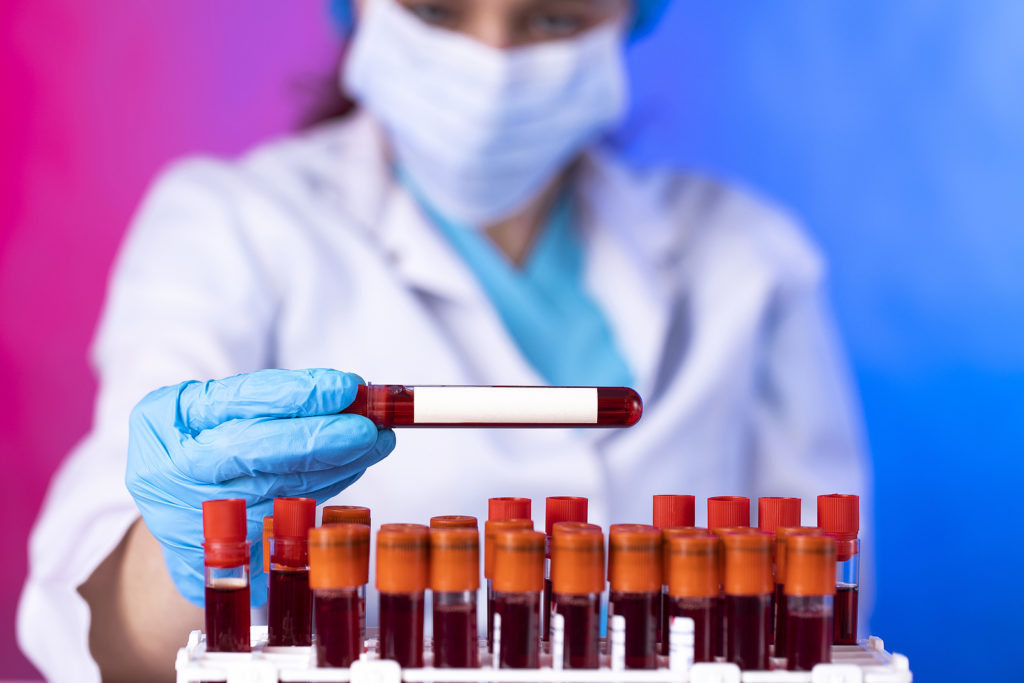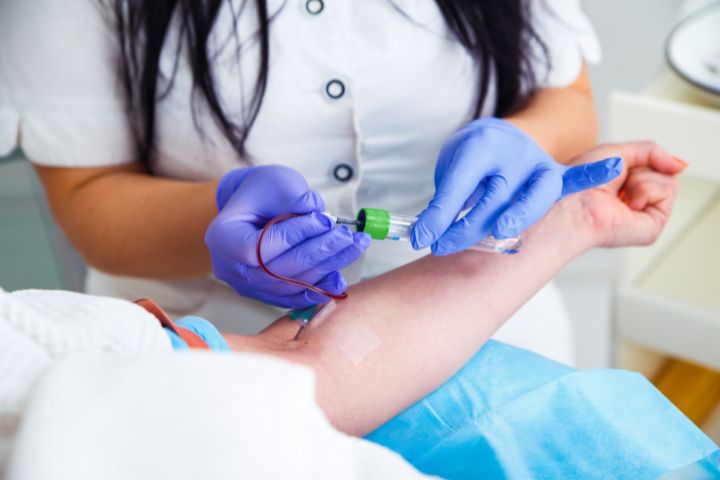Phlebotomy Classes Near Me: What You Should Know
Phlebotomy Classes Near Me: What You Should Know
Blog Article
The Path to Accreditation: Recognizing the Phlebotomy Training Training Course Journey and Its Relevance
As you consider the course to certification in phlebotomy, it is very important to recognize the function you'll play in medical care. Your training will cover crucial skills, from blood collection techniques to patient interaction. Each part of the program prepares you for the challenges in advance. Yet what specifically does the journey require, and why is certification so critical for your future profession? Let's discover these questions additionally.

The Role of Phlebotomists in Health Care
Phlebotomists play an essential function in the health care system, functioning as the crucial web link in between people and important diagnostic testing. You'll carry out blood attracts, ensuring examples are accumulated accurately and securely. Your knowledge helps in identifying medical problems, keeping track of health, and assisting therapy choices.
In your daily communications, you'll require to develop trust fund with people, making them really feel comfortable throughout what might be a difficult experience. You are accountable for classifying and managing examples very carefully to avoid contamination or errors, which can impact examination results.
Yet, you'll frequently function together with doctors and nurses, communicating important info concerning clients' problems. Your function is basic in preserving the workflow in healthcare setups, guaranteeing prompt and accurate results. By understanding your skills, you add meaningfully to person care, making you a crucial component of the medical group. Welcoming this responsibility is key to your success as a phlebotomist.
Introduction of Phlebotomy Training Programs
When checking out phlebotomy training programs, you'll locate numerous kinds made to fit various routines and discovering styles. Each program assists you create essential abilities like blood collection and person communication. Recognizing these alternatives is vital to picking the right course for your career.
Types of Educating Programs
A number of types of training programs are offered for those looking to end up being proficient in phlebotomy. Furthermore, some hospitals and clinics offer on-the-job training programs, giving sensible experience while you discover. Whatever path you choose, each program intends to outfit you with the essential skills for a successful phlebotomy career.

Trick Skills Developed
Mastering phlebotomy requires a collection of vital abilities that are developed through complete training programs. Furthermore, interaction skills are fundamental; you'll need to communicate with patients, describe procedures, and put them at ease. Each of these abilities is essential for your success as a qualified phlebotomist, making you a useful property in any type of medical care setup.
Key Elements of a Phlebotomy Training Course
In a phlebotomy program, you'll concentrate on necessary topics that prepared for your future profession. You'll participate in hands-on training that allows you to use what you've discovered in real-world setups. Both the core educational program and useful experience are vital for your success as a phlebotomist.
Core Educational Program Summary
While seeking a phlebotomy training course, you'll run into a core curriculum created to equip you with basic abilities and understanding. Phlebotomy Training Course. This educational program usually includes composition and physiology, concentrating on the circulatory system and recognizing blood elements. You'll additionally learn more about various sorts of blood collection approaches, including venipuncture and capillary slit strategies
In addition, infection control and safety methods are necessary elements, guaranteeing you recognize just how to keep a sterilized atmosphere. You'll examine patient communication, highlighting communication and compassion, which are crucial for relieving client anxiousness. Honest and legal factors to consider will certainly be dealt with, preparing you for real-world responsibilities. This fundamental expertise will enable you to stand out as a phlebotomist and supply high quality care in professional settings.
Hands-On Training Experience
Obtaining hands-on experience is a vital part of your phlebotomy training program. This practical training permits you to use what you've discovered in a real-world setup, enhancing your skills and self-confidence. You'll practice venipuncture methods, find out exactly how to take care of different sorts of samplings, and get aware of the equipment utilized in the area. Under the guidance of seasoned instructors, you'll fine-tune your abilities, guaranteeing you're prepared for any circumstance you may deal with.
Furthermore, you'll get the chance to interact with individuals, which is essential for creating your communication skills. This mix of technical effectiveness and social abilities is essential for your success as a certified phlebotomist. Inevitably, hands-on training is where theory meets method, strengthening your knowledge and readiness for certification.
Accreditation and Licensing Requirements
Prior to you can start your career in phlebotomy, it is crucial to understand the qualification and licensing requirements that vary by state. Most states need phlebotomists to hold a qualification from an acknowledged company, such as the National Phlebotomy Association or the American Society for Professional Pathology. These certifications typically include passing a test that tests your understanding and abilities in the area.
In addition to qualification, some states have particular licensing needs. You might require to finish a certain number of hours in professional technique, submit proof of training, or go through a history check. It is very important to research your state's guidelines to make certain you fulfill all necessary requirements.
Staying informed concerning these needs not only helps you secure a position however likewise enhances your reputation as a specialist. By meeting these needs, you'll be well on your means to an effective job in phlebotomy.
Hands-On Training and Practical Experience
Hands-on training and sensible experience are essential parts of your phlebotomy education, as they allow you to use academic knowledge in real-world situations. Throughout your training, you'll take part in supervised venipuncture, learn proper methods, and become aware of numerous blood collection tools. This direct participation is important for constructing your self-confidence and refining your skills.
You'll work carefully with knowledgeable specialists who can guide you via the nuances of client interaction and example handling. Each method session not just strengthens your understanding however additionally Web Site prepares you for the fast-paced atmosphere of healthcare settings.
Furthermore, lots of programs include scientific turnings, permitting you to experience varied setups, from healthcare facilities to outpatient clinics. This exposure aids you adapt to various obstacles and patient needs, ensuring you're well-prepared for your future function. Accept these possibilities, as they're important to becoming a competent and thoughtful phlebotomist.
Obstacles Dealt With Throughout Training
While acquiring hands-on experience is vital, it's essential to recognize the obstacles that can develop during your phlebotomy training. Additionally, understanding the skills needed for blood draws takes technique; you might have a hard time with technique originally.
Time management can likewise be a hurdle, as harmonizing concept, useful sessions, and individual commitments can feel daunting. You might face differing learning speeds amongst your peers, leading to feelings of insecurity if you assume you're falling back. Lastly, adjusting to the various personalities of trainers can be challenging, as each may have a special mentor design.
Acknowledging these barriers at an early stage can prepare you for success and help you establish strength throughout your training trip.
Occupation Opportunities After Certification

As you get experience, you might also consider concentrating on areas like pediatric or senior citizen phlebotomy, dealing with specific patient requirements. Some phlebotomists choose to advance their occupations by becoming research laboratory professionals or going after more education in healthcare fields.
In addition, your accreditation can lead to duties in training or monitoring brand-new phlebotomists, allowing you to share your knowledge. With the health care market consistently growing, your skills will always remain in need, paving the method for a stable and satisfying occupation. Embrace the chances waiting on you!
Frequently Asked Questions
What Is the Common Duration of a Phlebotomy Training Course?
Phlebotomy training courses commonly last around 4 to 8 weeks. You'll involve in hands-on practice, classroom instruction, and online knowing. Completing this training prepares you for certification and a satisfying occupation in medical care.
Are Online Phlebotomy Courses Available?
Yes, on the internet phlebotomy programs are offered. They provide versatility and benefit, allowing you to study at your own pace. Simply validate the program is approved to satisfy accreditation requirements and gain valuable abilities for your occupation.
Exactly How Much Does Phlebotomy Training Normally Expense?
Phlebotomy training usually costs in between $700 and $2,500, relying on the program and place. You must take into consideration elements like course size, consisted of products, and hands-on experience when selecting the right training for you.
What Prevail Prerequisites for Phlebotomy Training?
Common prerequisites for phlebotomy training typically consist of a secondary school diploma or GED, booster shots, and a background check. Some programs may likewise require standard medical care understanding or accreditations, guaranteeing you're planned for hands-on training.
Can I Function While Completing My Phlebotomy Training?
Yes, you can function while completing your phlebotomy training. Many trainees balance jobs with their studies, but have a peek here make certain to manage your time efficiently to assure you fulfill both work and training commitments efficiently.
Report this page